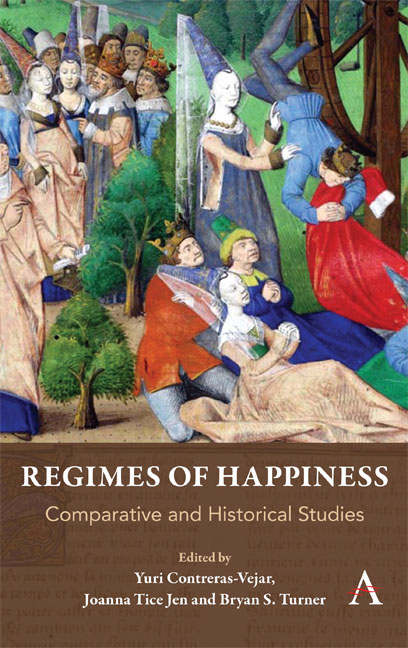Book contents
- Frontmatter
- Contents
- Acknowledgements
- Notes on Contributors
- Introduction: Reflections on Regimes of Happiness
- Part I Happiness in the West
- Chapter One A Fragment of Bliss: Augustinian Beatitudo and the Ideal of Atonement
- Chapter Two Arts of Happiness and Love: Translating Aristotle in the Later Middle Ages
- Chapter Three Spiritual Transcendence as the Path to Happiness in a Selection of Old French Texts
- Chapter Four On Machiavelli, St. Francis and the Pursuit of Happiness
- Chapter Five Their Idea of Happiness Prevents Easy Categorization of Scottish Enlightenment Philosophers
- Chapter Six A Path to Eternal Happiness: Convent Life in the United States in the Nineteenth Century
- Chapter Seven “Be Joyful Always!”: Twenty-First-Century Evangelical Conceptions of Happiness and Trumpist Politics
- Chapter Eight The Erasmus Program: The Promise of European Happiness
- Chapter Nine Innovations in the Psychological Study of Happiness: From Mirror Neurons to Mobile Technology
- Part II Comparative Perspectives
- Index
Chapter Two - Arts of Happiness and Love: Translating Aristotle in the Later Middle Ages
from Part I - Happiness in the West
Published online by Cambridge University Press: 29 May 2019
- Frontmatter
- Contents
- Acknowledgements
- Notes on Contributors
- Introduction: Reflections on Regimes of Happiness
- Part I Happiness in the West
- Chapter One A Fragment of Bliss: Augustinian Beatitudo and the Ideal of Atonement
- Chapter Two Arts of Happiness and Love: Translating Aristotle in the Later Middle Ages
- Chapter Three Spiritual Transcendence as the Path to Happiness in a Selection of Old French Texts
- Chapter Four On Machiavelli, St. Francis and the Pursuit of Happiness
- Chapter Five Their Idea of Happiness Prevents Easy Categorization of Scottish Enlightenment Philosophers
- Chapter Six A Path to Eternal Happiness: Convent Life in the United States in the Nineteenth Century
- Chapter Seven “Be Joyful Always!”: Twenty-First-Century Evangelical Conceptions of Happiness and Trumpist Politics
- Chapter Eight The Erasmus Program: The Promise of European Happiness
- Chapter Nine Innovations in the Psychological Study of Happiness: From Mirror Neurons to Mobile Technology
- Part II Comparative Perspectives
- Index
Summary
This essay tells one strand of a story in which philosophies of happiness and arts of love mixed and mingled— in both philosophical and literary traditions. The very idea of a philosophical art of love leads us back to Ovid, whose Ars amatoria (Art of Love, composed c. 2 CE) plays upon a vigorous tradition of instruction about love (“erotodidaxis”) already existing across the discourses of elegy, philosophy, drama and erotic treatise. As scholars have long noted, in Ovid's hands— and with his signature irony— erotic instruction engages in political and ethical questions as much as amatory matters. In contrast to the genre of the love elegy, Ovid's Ars amatoria does not create an opposition between love and civil life, but rather “sets up love as a serious ethical concern” (Green 2006, 7). Ovid portrays sexual pleasure as the root of human civilization and the height of fulfillment— the highest reward for self- knowledge. The Latin and vernacular literature of Western Europe in the later Middle Ages inherited Ovid's version of the erotodidactic tradition, and this essay explores some medieval transformations of the “art of love” as they relate to discourses of happiness. Ovid's Ars amatoria itself was widely read, commented upon and variously adapted and translated into Western European vernaculars (Minnis 2001, 35–81). I am most interested here in the absorption of Ovidian erotodidaxis into philosophical discourse.
A striking example of such absorption occurs in the twelfth century, when Andreas Capellanus wrote a widely circulated Latin treatise, De amore, clearly modeled to some extent on Ovid's text, with the narrator adopting the pose of the praeceptor amoris. The De amore— a treatise partly in the form of a scholastic quaestio dedicated to another man on the subject of heterosexual love and possibly written at the request of Marie de Champagne in the 1180s— had wide enough (and controversial enough) circulation to be included in a list of condemned texts by the bishop of Paris in 1277; Andreas's work is one piece of evidence among many that the genre of the “art of love” had already been assimilated to the forms of scholastic philosophy.
- Type
- Chapter
- Information
- Regimes of HappinessComparative and Historical Studies, pp. 25 - 38Publisher: Anthem PressPrint publication year: 2019

